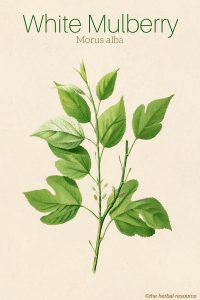White mulberry is an important herb in traditional Chinese medicine (TCM) and records of its use date back to 659 AD.
The leaves, root, branches, and fruits are still listed in the Chinese Pharmacopoeia from 1985, but other parts, such as the plant juice and the ash of the tree, are also widely used.
The leaves of white mulberry have expectorant properties and can be helpful in expelling mucus caused by respiratory tract infections.
They induced perspiration and have an antibacterial, astringent, diaphoretic, hypoglycaemic, odontalgic and ophthalmic effect.
They are used traditionally to treat fever, sore throat, cough, colds, flu, eye infections, nosebleed, headache, and dizziness.
An injection of an extract of the leaves, followed by internal dose of the sap (mixed with sugar), has been shown in recent studies to be effective as a treatment for elephantiasis (a parasitic infection resulting in extreme swelling in the arms and legs) and tetanus (lockjaw), an infection characterized by muscle spasms.
The branches (stems) are regarded to have an antirheumatic, antispasmodic, diuretic, hypotensive and pectoral effect, and are often used to reduce water retention (edema) and for rheumatic pains and spasm in the upper limbs.
The bark is regarded to have anthelmintic and purgative properties and is used to expel tapeworms.
The root bark has antiasthmatic, antitussive, diuretic, expectorant, and sedative properties. It is often used in traditional Chinese medicine to treat asthma, bronchitis, edema, and diabetes.
In addition, the root bark has also been shown to lower blood pressure and a tincture of the bark is used to relieve a toothache.
The fruit is believed to have a tonic effect on kidney energy and is used as a remedy for urinary incontinence, constipation in the elderly, dizziness, tinnitus, insomnia caused by anemia, and to prevent premature graying of the hair.
[Read more about White Mulberry…]

Leave a Reply